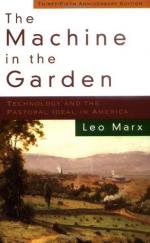
|
| Name: _________________________ | Period: ___________________ |
This test consists of 5 multiple choice questions, 5 short answer questions, and 10 short essay questions.
Multiple Choice Questions
1. How have the relationships between the city and country changed in American industrial pastoralism?
(a) They are both reinvented by machines.
(b) They are no longer interdependent.
(c) They are no longer exclusive.
(d) They are both monetized.
2. What part of 'The Tempest' held special interest for Marx?
(a) The portrait of an unspoiled landscape invaded by Europeans.
(b) The portrait of love's frailty against political power.
(c) The portrait of men who gain power by disposing of natural resources.
(d) The portrait of indecision about taking the throne.
3. Why did Beverly feel as he did by the end of his work?
(a) He saw a unique opportunity in the New World.
(b) He thought that the settlers and natives could work together.
(c) He thought the New World would improve the settlers.
(d) He thought that the New World could improve the natives.
4. How had feelings about nature changed by Jefferson's time?
(a) Nature seemed chaotic and devilish compared with civilization.
(b) Nature seemed benevolent compared with the disordered city.
(c) Nature had become a mirror for man's corrupt soul.
(d) Nature seemed divine and benevolent compared with corrupt man.
5. In Jefferson's time, how did the eastern farmers come to see nature, as a result of their work?
(a) As a raw material.
(b) As a domestic industry.
(c) As an improved nature.
(d) As a new nature.
Short Answer Questions
1. When did Robert Beverly write his history of Virginia?
2. What economic consequence does the sentimental pastoral ideal engender?
3. What does Marx say is the leading image of industrialism?
4. How have liberal thinkers portrayed the sentimental pastoral ideal, in Marx's account?
5. What does an individual gain by passing through these three spatial stages?
Short Essay Questions
1. What feature of American culture allowed Jefferson's ideal to survive for 100 years?
2. How had the Enlightenment changed pastoral thought by the time of Jefferson?
3. What contradiction marks the early accounts of the New World, according to Marx?
4. In what way does the railroad symbolize the industrial intrusion into a pastoral idyll?
5. How does Marx describe the value of Shakespeare's 'The Tempest' in 'The Machine in the Garden'?
6. How did Jefferson separate America and Europe in his Notes on Virginia?
7. What ideal does the conclusion to Shakespeare's 'The Tempest' suggest, in Marx's interpretation?
8. What does Marx mean when he says that America offered a middle way for men?
9. What view did the colonists take of the New World in the early years of colonization?
10. How does Shakespeare demonstrate the impossibility of the pastoral ideal?
|
This section contains 853 words (approx. 3 pages at 300 words per page) |

|




